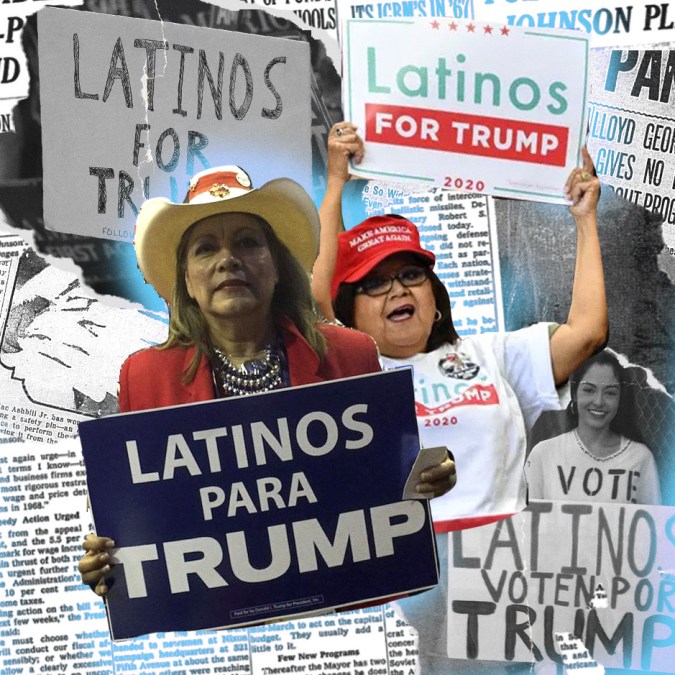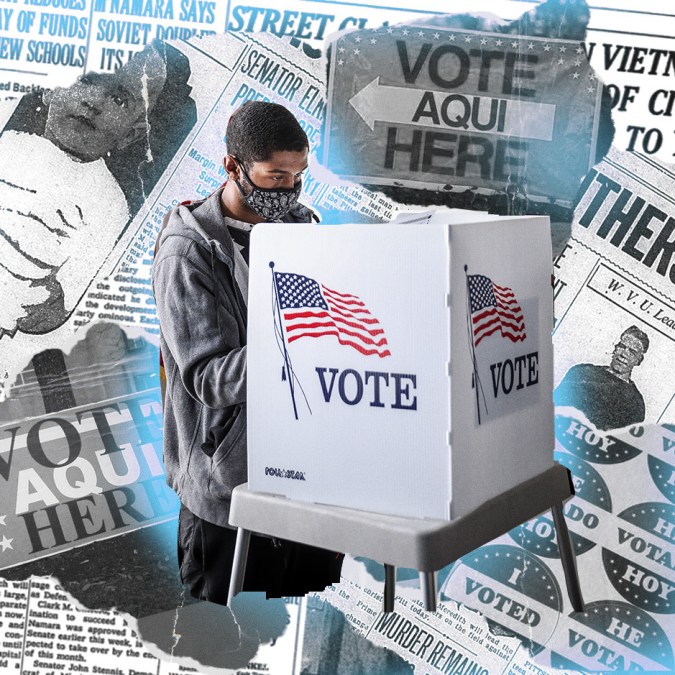“I love my freedom!” Floridian musical trio Los 3 de la Habana sings in their “Trump Song”—now an anthem for Latines who support Donald Trump. Already, this 2020 presidential election shows that some Latinos in Florida helped President Trump secure Florida, while Latinos in Arizona played a key role in Joe Biden’s success in the swing state. Thus, our understanding of “freedom” is clearly not monolithic nor inherently linked to one political candidate or party.
What are Trump-supporting Latines hoping for in a second term? Andi Clark, a Texas-based 28-year-old who volunteers as a translator for Democratic voter registration nonprofits, has been exploring that question with fellow Venezuelan immigrants—many of whom also grew up surrounded by “magazolanos,” MAGA-supporting Venezolanos—for some time.
“How does the way Trump talks trash not remind you of Hugo Chavez?” is a question she often poses to her family members. Yet, pundits who say things like, “We don’t want to end up like Venezuela,” in response to policies such as Medicare for All, have successfully tapped into deep-seated fears in many Latine communities. “It is the most effective system of disinformation I have ever seen,” Clark tells Remezcla of the conspiracy theories saturating her WhatsApp. She wasn’t the only one who suspected Trump might make strides in some of our communities this election cycle.

“For the past 3 election cycles, we have been working to get 3.5 million Black and Brown voters registered in Florida,” Eric Borja, the Digital Director of the progressive voter coalition Florida For All, tells Remezcla. They ended up registering about 2 million new voters this time around, but Trump’s success in the state was ultimately not a total shock.
Our understanding of ‘freedom’ is clearly not monolithic.
Borja points to figures like Enrique Torria—a Proud Boys chairman of Cuban descent who was involved in Florida’s Latinos for Trump coalition—as the type of machista leader who has resonated with Latinos in particular. Latinos are 4 times less likely to vote for Biden than Latinas, according to a Siena College-New York Times study. Borja also believes that Trump’s support from some lower-income Latines (who don’t necessarily benefit from his tax cuts) also stems from a lack of job opportunities in the Sun Belt, where they find employment as police officers or Border Patrol.
For many of us, Trump’s success—even among Florida’s long-standing conservative with Latines—came as a surprise considering his track record. While 45 inherited an unjust immigration system, his administration has made obtaining citizenship in the so-called land of the free nearly impossible with a rise in asylum application costs and an attempt to upend Deferred Action for Childhood Arrivals (DACA) along with Temporary Protected Status (TPS). Under his watch, our nation has also consistently dehumanized immigrants—caging migrant children, losing track of 545 of their parents, deporting immigrants who were infected with COVID on U.S. soil, and performing forced hysterectomies.

“This administration has no fear of retribution,” Daniella Burgi-Palomino, co-director of the Latin American Working Group, tells Remezcla. In the middle of a pandemic, “The U.S. asylum system has been decimated,” she adds. COVID-19 and its shuttered borders has offered this administration the excuse it has sought since 2016 to turn migrants away without hearing their asylum cases. In light of the confirmation of Justice Amy Coney Barett, who has historically ruled against asylum-seekers, Burgi-Palomino worries that, if re-elected, Trump may deny migrants due process indefinitely.
Trump’s fixation on undocumented immigrants has also led some to turn a blind eye to the same Latin American human rights violations that motivate migration. Far from standing in solidarity with our neighbors in the Northern Triangle, the U.S. government has cut aid to Black, Indigenous, and LGBTQ+ human rights defenders, while ICE [Immigration and Customs Enforcement] has extended its treacherous reach beyond its borders.
Trump has somehow made gains among demographics most negatively impacted by his policies.
In spite of this enhanced violence on the border and inaction in the face of existential threats such as climate change, Trump has somehow made gains among demographics most negatively impacted by his policies. We know he would never have set foot in the White House were it not for the white supremacy that underpins his ideology and the white people who make up his voter base. That said, according to developing exit polls, at the time of publication, although Biden was the overwhelming preference amongst POC, 3% more Latinas and 5% more Black men voted for him in 2020 than in 2016, while white more white women cast their ballots for Trump as well. Still, if he were to win, folks like Congresswoman Alexandria Ocasio-Cortez believe not all hope is lost.

“COVID has prepared us quite well [for a second term] because our campaign has made significant investments in political education through holding digital seminars on how to resist ICE… and how to form safety pods for childcare,” AOC tells Remezcla at a recent press conference. “Mutual aid is going to be extraordinarily important with either outcome but most specifically with Trump.”
Mutual aid is going to be extraordinarily important.
If Trump were to successfully win a second term, his administration would likely deepen divisions across class, race, and immigration status that already scatter Latines across the political spectrum.
“All of us are in different information bubbles,” Borja says, reflecting on the nuances of his conversations with Floridian voters and his own parent’s ideological evolution as Salvadorean leftists with conservative social views who grew to be more socially progressive thanks to dialogue with their son. “We need to meet people where they are and speak to their values.”




